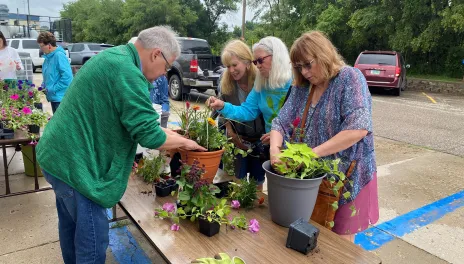NDSU Extension’s Aging in Community Project brings care to rural communities
NDSU Extension’s Aging in Community Project brings care to rural communities
Two-thirds of North Dakota’s 53 counties are designated as frontier, meaning fewer than six people reside per square mile. The population has gradually migrated toward the state’s larger towns, leaving many older adults in these sparsely populated regions without a reliable community network of support.
On top of that, social isolation can weigh heavily on communities and can compound natural aging issues. Residents face a decision between staying in an area without accessible services or leaving the area for a larger city, a move that can be especially difficult for older adults.
In 2022, North Dakota State University Extension started the Aging in Community Project to assist older adults in these communities. The AIC Project is a model of community support to enhance the lives of older adults and to prevent or delay moving from their rural town. Volunteers’ support includes transportation, food and nutrition classes, fall prevention education, technology assistance and more.
AIC is based on a successful community-based support model called Community of Care, started in rural Cass County over 20 years ago. That model has proven to help older adults live with autonomy and dignity.
“When implementing Aging in Community, we discussed how Extension could address some of these issues using the same needs assessment process as Community of Care,” says Jane Strommen, NDSU Extension gerontology specialist and AIC Project director.
The project team was led through an informal, grassroots assessment for two communities: the Lisbon area and western Morton County. Those two areas have a high NDSU Extension presence, and the team wanted to pilot the program on opposite sides of North Dakota.
Since 2022, these two pilot communities have been evaluated for effectiveness, replicability and sustainability.
Three years into the project, AIC has reached over 8,000 direct contacts with older residents through a network of services and supports. Community social events have been well-attended, reaching around 1,200 people in 2023 and again in 2024.
Transportation is a crucial focus area for AIC. Since 2022, 805 rides — over 60,000 miles — have been given by volunteers. These rides are for healthcare visits, for groceries and to visit family members.
“I don’t have a vehicle that’s running and I live 10 miles from town,” says Jolene Loudon, a Lisbon area AIC participant. “Before, I felt so out of touch with everything, and they’ve just filled that void. AIC has changed my life.”
Participants in AIC have progressively felt more confident, independent and connected with community resources. Additionally, the areas’ steering committees have reported a revitalization in local social circles.
“Older adults now feel like, ‘Oh, I can stay here. I can stay in my hometown and age there and have the services that I need,’” says Heidi Peltz with AIC partner Western Plains Public Health. “There are older adults in the community I didn’t even know about that have come and reached out for services.”
The pilot project has gotten national attention. AIC was featured in an NPR article and is slated to appear on CBS Sunday Morning.
The pilot project’s success has project leaders hoping to expand its services in the future.
AIC is supported in part by a four-year, $1,605,000 grant from Margaret A. Cargill Philanthropies.
FOR MORE INFORMATION
Jane Strommen, Extension gerontology specialist, 701-231-5948

